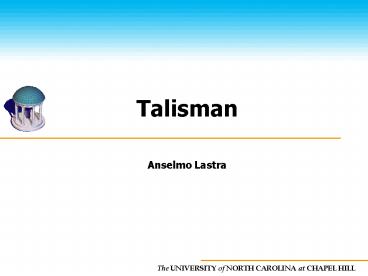Talisman PowerPoint PPT Presentation
1 / 20
Title: Talisman
1
Talisman
- Anselmo Lastra
2
History
- Attempt to make a low-cost accelerator and media
processor for PCs - Note mid- to late-90s period
- For a while it was an active development project
at Microsoft - Had chip partners Samsung and Fujitsu
3
Vision
- Ubiquity
- Inexpensive hardware
- Minimum level of capability and quality to carry
wide range of applications - Compelling content
- They assert that requirements and metric of
performance for a ubiquitous graphics system to
be much different than that for CAD - Other companies also going for media and chose
innovative architectures - NV1 and quadratic texture maps (?)
- Note quote about SGI not needing to fear PCs!
4
Argument
- Graphs of memory capacity and bandwidth
requirements to motivate - Seem about right
- Not clear their solution was merited
- By time it was due out, market conditions changed
- Memory costs plummeted
- Caching was used
5
Features
- Exploit coherence
- Not render everything every frame
- Now wed call it using impostors
- High quality filtering to make use of low-res
images not as objectionable - Region-based rendering
- They call it chunking
- Lots of compression
- Only 4MB of DRAM
- Not an explicit frame buffer
6
Rendering Objects
- Objects selected by app or system
- Binned to 32x32 chunks
- Objects rasterized and z-buffered
- In chunks
- Resulting image compressed and stored
- JPEG-like compression, 101
- Warped (affine transforms) and used for multiple
frames - Re-rendered when necessary
7
From Rendering with Coherent Layers, S97
From Rendering with Coherent Layers by Jed
Lengyel, John Snyder, S97
8
Choosing Layers
From Rendering with Coherent Layers by Jed
Lengyel, John Snyder, S97
9
Factored Shading
- Talisman to have a color modulation factor per
sprite
From Rendering with Coherent Layers by Jed
Lengyel, John Snyder, S97
10
What Kind of Warp
From Rendering with Coherent Layers by Jed
Lengyel, John Snyder, S97
11
Deciding When to Render
- They used a regulator algorithm
- Measure error at fiducials
From Rendering with Coherent Layers by Jed
Lengyel, John Snyder, S97
12
Regulation Algorithm
13
Results
From Rendering with Coherent Layers by Jed
Lengyel, John Snyder, S97
14
Results (camera moving)
- N3 is use of a sprite for 3 frames. The others
are error from 0.1 to 0.8 pixels - Normalized to highest value of N3
15
Pros and Cons
- Only need one-chunk z-buffer
- Special hardware that clears quickly (z-clear
bit?) - Can afford better antialising
- Re-use for several frames
- So cost is amortized
- Objects have to be non-penetrating
- Might be hard to accomplish
- Paper by Snyder and Lengyel at S98 gives sorting
algorithm
16
Rendering Features
- Anisotropic filtering
- Priority to arbitrate between co-planar pixels
- Is this necessary?
- A-Buffer antialiasing
- 4x4 mask
- More about a-buffer in future class
- Shadow Maps
17
Compositing at Scanout
- Hardware to composite fast enough to keep up with
video - Two 32-line-high buffers
- One for scanout
- Other for compositing
- Similar to a rasterizer
- Only bilinear filtering
- Not many details
18
Region-Based Rendering
- Pros and cons
- Is it a good idea?
- What varieties can you think of?
19
Brute Force
- Does it make sense to use tricks like these? Can
we just wait for technology to enable brute-force
rendering?
20
Standard APIs
- They certainly enable applications
- make it possible to code for many pieces of
hardware - Do they stifle innovation?

